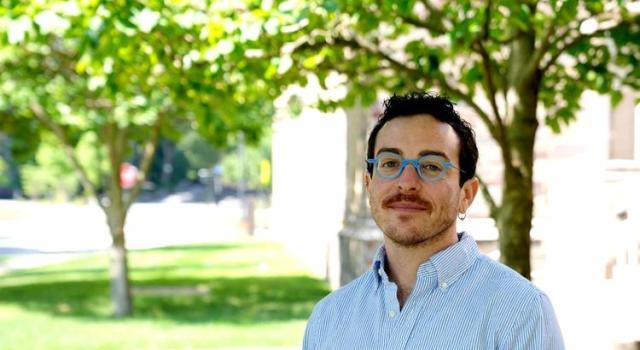
rl Goldberg

rl Goldberg's research and teaching focus on trans and queer studies, phenomenology, pedagogy, and 19th and 20th century U.S. literature. They received their A.B. from Harvard College and their Ph.D. from Princeton.
Goldberg's first monograph, I Changed My Sex! Pedagogy and Trans Narrative is forthcoming from Columbia University Press. They are also co-editing a volume, Reassignments: Trans and Sex from the Clinical to the Critical, under advance contract with Fordham UP, with Kenyon College professor Alex Brostoff. They have published articles about trans epistemology, pedagogy, autotheory, pornography, and trans sleaze books, and regularly write public-facing scholarship.
Before coming to Hampshire, Goldberg was a longtime teacher with Princeton's Prison Teaching Initiative, teaching courses in writing, gender studies, and English literature in carceral facilities across New Jersey.
Recent and Upcoming Courses
-
This course takes, as its critical object, trans representation in film. We will consider how visibility functions and operates in trans films, from The Silence of the Lambs (which shaped trans representation in the mainstream media for decades), to early trans films like Behind Every Good Man (which served as pseudo-documentaries for a curious cis public, exposing the lives of Black and Brown trans people), to contemporary trans film (geared to both arthouse and mainstream audiences). We will discuss the various tropes that have congealed into popularly circulating stereotypes about trans people and read theoretical texts that engage the material and technical aspects of film to understand the various complicated lives of these tropes. Together we will ask: what are the stakes of trans visual representation? How do these tropes evolve over time? In a largely white archive how is whiteness as power figured? When race, class, citizenship, or HIV status are thematized, what forms do these representations take? Keywords:Trans, film, archives, moving image, theory
-
What does it mean to be trans? What are the archives we might study to understand how trans has been named, theorized, and expressed in the United States? Considering the trans cultural production from theory to literature to film to art and music we will critically study representations of trans in the U.S. and how these representations are informed, inflected, and challenged by structures of power, care, and change. We will pay special attention to trans as it is inflected by racial formation, marginalization, class, disability, and systems of exclusion, while attending to the various ways trans cultural producers have resisted and challenged systemic injustice. Keywords:trans, literature, poetry, film, theory
-
This course will survey trans film across genres-documentary, sleaze, horror, comedy, romcom-to consider the various ways that trans has been represented in moving image from the mid-century to today. Special emphasis in this course will be placed on observation, description, and appreciation as our primary methodologies. Keywords:trans, film, moving image, documentary, horror
-
What is trans film? This course will survey trans film across genres-documentary, sleaze, horror, comedy, romcom-to consider the various ways that trans has been represented in moving image from the mid-century to today. This version of the course, running contiguously with another section of Trans Film, will focus on theory, from trans and queer studies, to film theory. Keywords:trans, film, moving image, documentary, theory
-
This course attends to English-language queer poetry from the 20th and 21st centuries. What is a poem? What makes a poem queer? With special attention to both form and style, this class will consider various examples of queer poetry and will engage with questions of history, social organization, intertextuality, and queer theory to understand some of the meanings of queer poetics. Keywords:poetry; queerness; enjambment; poetics
-
When Joe Biden was asked in 2019, at a campaign stop in Iowa, how many genders there are, he stumbled on a compelling response: "There are at least three." Beginning from this premise-from the indeterminacy of the "at least" and its refusal of a certain taxonomy-we will read from various trajectories of trans literature and theory and engage whalct it means to read "difference" in literary accounts of trans. Investigating how discourses of power and institutions of normativity have come up against trans embodiment, narratives, and politics, we will consider how such encounters are historically situated in relation to national formations, carceral states, and racial capitalism. As we work through texts that range across both region and time, we will pay close attention to the ways in which desire, gender, and sexuality are queerly narrativized and mediated by and through trans geographies. Keywords:Transgender, transsexual, literature, fiction, stone butch blues
-
What is the idea of the University and how did we materially find ourselves here? What, or who, is the University for? The University, as we now know it, is a place of immense contradiction: supposedly sites of nationalist or cultural cohesion, but also, as Bill Readings has shown, empty signifiers for "excellence." Places where we might theorize queer horizons, but, at the same time, institutions that have financial investments in anti-queer industries like weapons, prisons, and dispossessive technologies. In this class we'll trace a history of the University and its interfacing with queerness, from the GI Bill to today's encampments for Palestine. We'll seek to understand how it was that queerness became absorbed into the University, and to what ends. Throughout, we'll think queerness alongside other topics in critical university studies: labor, precarization, globalization, debt, and neoliberalism's phagocytic relation to "difference." Keywords:University, theory, educational justice


